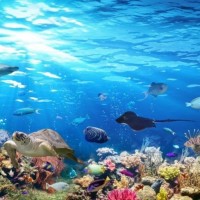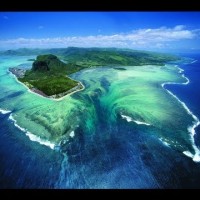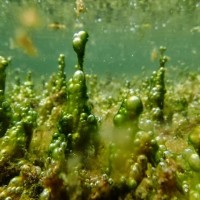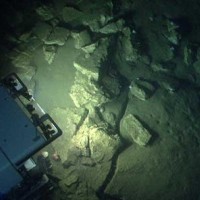Top 10 Coolest Facts About Oceans
Mankind knows almost everything there is to know about the world which we live on, with scientific explanations for every mystery and photos of every corner of our lands, but the one thing that's still extremely mysterious and unexplored on our Earth are our oceans. You've probably got a good idea of what our oceans are like, and you've probably been in one at some point of your life, but in reality, we don't know much about the water that covers 71% of our Earth, and some of the things that we do know are mind-boggling.
I'm sure that if you were asked whether there was more life in or out of the oceans on Earth, you'd probably assume that there's more life in the oceans, because they do cover much more of the Earth's surface than land does, but I doubt that you'd expect there to be such a gigantic imbalance, with 19 out of 20 living things on our planet coming from the oceans. This is just an estimate, because scientists haven't been able to explore much of the ocean and still have to classify a huge amount of the species who live there, but it's a very accurate estimate, and if it were to be wrong, it would only be because we estimated too low, meaning that it could be more like 96%.

While many would argue that it's not possible to have a waterfall underwater, you actually can. When different types of water meet, (for example, the fresh water that's near the surface meeting the saltier groundwater), the different temperatures can form huge volumes of water going down over cliffs, behaving almost exactly like a real waterfall. The Denmark Straight Cataract is more than 3 times taller than the highest above-water waterfall, Angel Falls in Venezuela, and is so enormous that it actually carries 2 thousand times more water than the Niagara Falls.

Many people say that trees recycle our carbon dioxide and produce oxygen and that without them, we would be in a lot of trouble when it comes to breathing, but really, that's not completely true. Though trees are super important in many other ways, the main thing that we have to thank for our oxygen are the oceans. More specifically, aquatic plants, things like plankton, kelp, and algae, as well as some bacteria, which are individually extremely small, but so numerous, and all over the huge amount of space in the oceans, that it produces an incredible amount of oxygen, which is often consumed right there by other animals in the ocean, but lots of it still makes its way to the air we breathe.
One weird thing about the oceans (and really, just water in general) is that sound actually travels a lot faster, which isn't what you would expect considering how much more dense water is, but it's actually true, and depending on the temperature of the water, it can be even faster. It makes trying to find out where the many sounds that scientists hear in the oceans come from really hard because it's travelling so fast, it could've come from anywhere!
One thing that's both intriguing and creepy at the same time is that all of the underwater species that we've classified, from sharks to whales to orcas to jellyfish to minnows, is only an estimated 91% of all the species that live in oceans. Almost all of these undiscovered species would live so deep underwater that they'll live without light, and under pretty extreme pressure, so I'm sure that there are some pretty incredible creatures down there. Who knows what could exist at that depth!
I don't even want to know what these species might look like. The ones we discovered already look horrible, I can't even imagine how uglier the others are.
Of all the famous mountain ranges on our land, from the Alps to the Rockies to the Himalayas, the largest is a mountain range called the Andes, with a length of around 7 thousand kilometers. The biggest of all the underwater mountain ranges, which usually mark the border between tectonic plates, is the Mid-Ocean Ridge, and it is around 65 thousand kilometers, over 9 times the length of the Andes, and extremely deep in the ocean.
We know about as much as we possibly can about oceans, but they're so vast and so deep that we've only been able to explore about 5% of the oceans, which is quite a bit, but still a very small amount when compared to all that we still need to explore. While most of us picture the kind of ocean that you'd have seen on Planet Earth videos or on the internet, of fish and other sea creatures only a few hundred, and at the most, a couple thousand feet below the surface, most of the ocean is without any light at all, and humans haven't explored it very much.
I'm sure that many people here know that the moon's not as big as you would think, the United States is actually slightly wider than the Moon, but it goes to show how big the Pacific Ocean is that 5 moons would have to be lined up to go from one end of it to the other. In the average spot in the Pacific Ocean, it's more like only 3 or 4 times wider, but at its widest point, which is from Indonesia to the top of South America, it's well over the length of 5 moons, which is pretty crazy to think about.

To put it into perspective to you, that's enough gold to give every single person alive on Earth right now 9 pounds of gold, with is worth a good chunk of money. In fact, all the gold in every government reserve, bank vault, or personal collection is less than 200 thousand tons, which pales in comparison to the 20 million deep in the ocean. You may be thinking "yay, free gold, time to go for a swim!" but the oceans are so huge that you could search for hours with hundreds of people and not find anything, and if you did it would probably be too diluted to be worth much, anyways.
Think about how much you use water every day, for drinking, bathing, washing things, brushing your teeth, and whatever else you do. Think about literally every single person on Earth doing that every day, too. All of that water isn't even a tiny fraction of the water on Earth, because the oceans are simply so massive that they contain over 96.5% of the water on Earth, and this is an immeasurably high amount of water.
I learned this when I was about 11, give or take a year. If you go too deep, the vessel you are traveling in has too much water pressure above it that it gets crushed like a tin can.